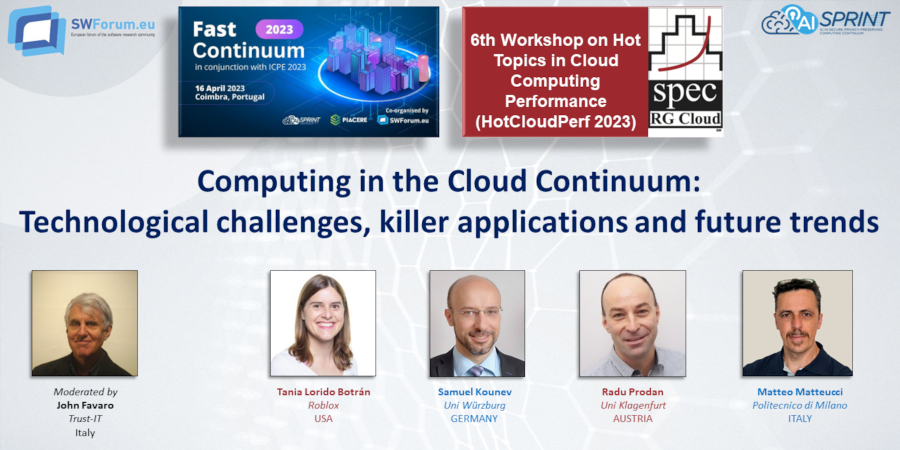FastContinuum 2023: SWForum.eu and AI SPRINT join forces in Coimbra, Portugal

On 16 April 2023, SWForum.eu co-organised FastContinuum 2023 in Coimbra, Portugal, together with sister project AI SPRINT. The agenda included a joint panel at the end with HotCloudPerf 2023, which was held in parallel. The objective of the joint panel was to consolidate the insights coming from each of the workshops.
Moderated by SWForum.eu communications lead John Favaro of Trust-IT, the panel featured keynote speakers from each of the two workshops, who contributed perspectives from their own work on the subject of Computing in the Cloud Continuum: Technological challenges, killer applications, and future trends.
John began by asking Samuel Kounev (of the University of Würzburg and FastContinuum keynote) how he viewed the paradigm shift to new ways of working in the computing continuum. Samuel expanded on his keynote message to describe an ever-more serverless continuum – that is, where the provider side incorporates all operational activities (relieving users of this burden), and users pay only for what they use (rather than what they reserve). Panelist Matteo Matteucci (Politecnico di Milano and FastContinuum author) expressed some reservations about a single, serverless continuum given the extraordinary heterogeneity he sees in his own work in AI-enabled robotics, vision, signal processing, and the like, and indicated that this heterogeneity will be one of the primary challenges going forward. Tania Lorido Botran (HotCloudPerf keynote) picked up on the topic, noting the broad heterogeneity of devices she sees in her work on the metaverse at Roblox in the U.S. Panelist Radu Prodan (University of Klagenfurt and HotCloudPerf keynote) added the observation that the continuum is currently wildly imbalanced, with massive cloud providers and powerful 5G facilities awkwardly co-existing with resource-scarce IoT devices, a situation of severe “impedance mismatch” in dire need of addressing before significant progress can be made. Matteo remarked that in fact this is yet another manifestation of the problem of extreme heterogeneity in the continuum, and that because of this, we will almost certainly see domain-specific solutions rather than a single, all-embracing architecture of the continuum – a remark that was quickly agreed upon by the panelists.
Picking up on the topic of domain-specific solutions, John asked the panelists which domains they believed would benefit from the continuum – what will be the “killer apps”? Tania quickly responded that the metaverse will surely be one such killer app. But then the conversation took a provocative turn, when Radu noted that “killer app” is an all-too-appropriate term for the unintended consequences that so many of our innovations have had, and we need to see the computing continuum for what it is: an instrument that can be used for the good of society, but also with the potential for invasive and destructive effects, citing as an example the phenomenon of social networks and the many associated problems they have generated for society. He proposed that we should concentrate on applications for sustainability, such as fighting climate change and conserving energy. When Samuel was asked by the other panelists whether his vision of a serverless continuum wouldn’t lead to more energy consumption by providers, he countered by explaining that in fact a serverless environment would very likely lead to the providers using less energy: if the users pay only for what they use (rather than for “always on” facilities), then the providers will be highly motivated to minimize energy waste on their side.
As the conversation evolved toward a discussion of what the future holds, John asked the panelists what they considered to be top priorities going forward. Tania noted the absolute need to ensure security and trust in the continuum, a statement that was quickly seconded by the entire panel. Coming back to the problem of the continuum’s impact on society, Radu pointed to the metaverse as an example of an application domain that would surely need a robust code of ethics – for example, with regard to children, leading to a comparison with the ethics issues being addressed, for example, in the EU’s High Level Expert Group for AI. While Tania agreed with the need for ethical underpinnings of the continuum (at least in certain domains), she said that, from her perspective, the major challenge ahead in the continuum is the management of data, rather than computing. In his FastContinuum presentation right before the panel, in fact Matteo had illustrated some of the principal challenges in federated learning for AI models (including the enormous challenges in dealing with privacy-protected datasets in certain domains such as healthcare), and the panel agreed that the phrase “computing continuum” was perhaps an unfortunate moniker that led us all to underestimate the challenges that lay ahead in dealing with the massive amounts of data that will pass through the continuum. As the panel drew to a close, John came back to Samuel and asked whether the vision of a serverless paradigm, where everything is taken care of transparently for the user, might be open to accusations of “sweeping the problems under the rug”. Samuel responded that a new paradigm such as the serverless approach is best seen as an objective, a goal – one that will only be achieved gradually over time (and perhaps never completely), as new challenges emerge and are resolved by new research and development.
Thanks to the vigorous and provocative discussions, both panelists and audience came away with a new appreciation for the continuum, not only as a powerful paradigm presenting formidable but exciting technical challenges, but also as a new societal force – one that is likely to have broad impact in all of our lives – presenting its own set of ethical and social challenges for all of us to consider.